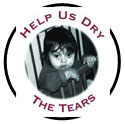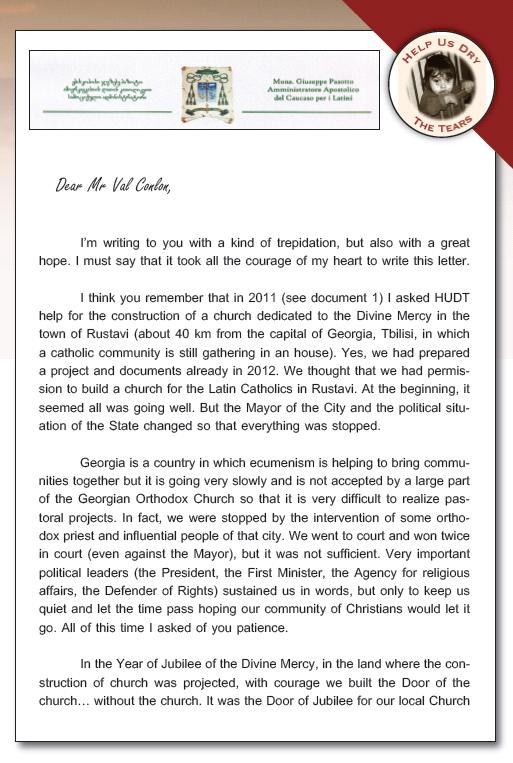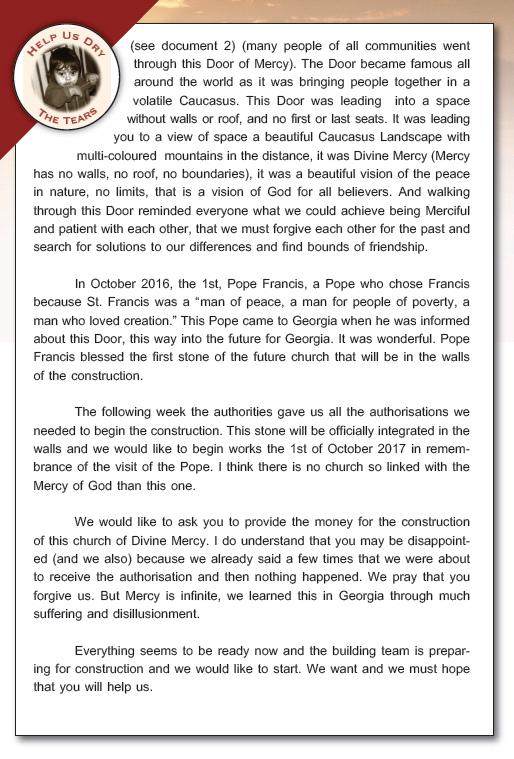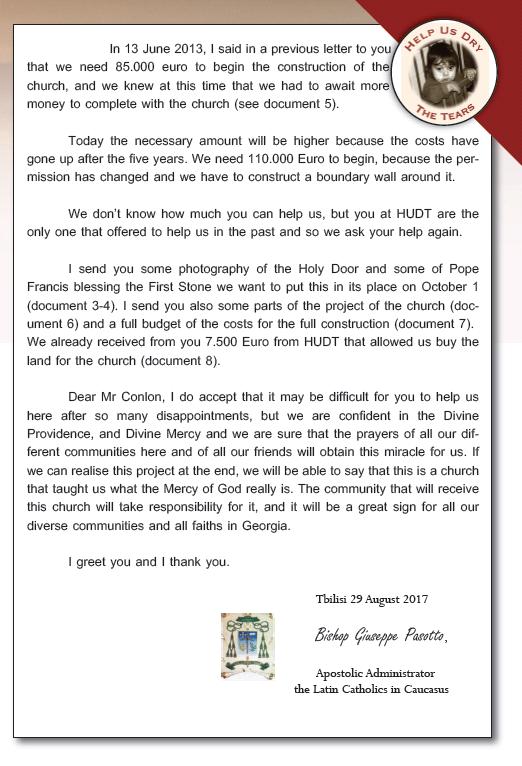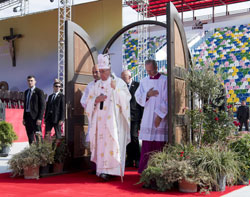 Pope in doorwayReligion down through the centuries has been blamed mostly by atheists and non believers for the hostility that erupts between countries and communities but its culture and nationalism that create differences not Religion.
Pope in doorwayReligion down through the centuries has been blamed mostly by atheists and non believers for the hostility that erupts between countries and communities but its culture and nationalism that create differences not Religion.
All of these battles occur with the adversaries asking their God to help and protect them in their disagreement with the other, but they are all asking the same God. For there is only one God.
We have now a situation in Georgia in the Caucasus where Religion and belief in God may be seen to bring communities of different denominations or even different faiths together by a simple belief of understanding that we are all praising the same God but just in different ways with different rituals. 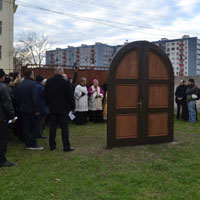 Door Of Mercy
Door Of Mercy
There must come a time in life where we pierce the mists of differences that dogs the path to understanding and accepting the dissimilarities in the way we live and worship God. Thus bringing peace, stability and unification between different peoples through accepting and understanding that there are the different ways to live, pray and worship God.
These Georgians may hold a key to a way of opening these century old doors that divide communities, who live beside each other but apart from each other for centuries.
Our HUDT charity was asked and is helping to build a church in Rustavi, South East Georgia, it will be a small church, but a huge symbol for stability and the unification of Georgian Orthodox Christians, Russian Orthodox Christians , Roman Catholic Christians, and we hope the Muslims of the Caucasus who also believe in Jesus Christ.
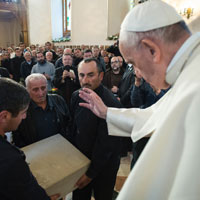 Pope Francis blesses Corner StoneThis all came about from a unexpected meeting with Bishop Giuseppe Pasotto, of Tiblisi, attending the opening of the new Divine Mercy church we build in Cupcini, Moldova. A place where there had not been a church since the Soviet Union occupied Moldova after the end of the Second World War. In that year, 1945, the Soviets closed all the Catholic churches and sent the priests to Siberian working camps in Russia. When he discovered we were the charity that built this church, he jokingly said I wish you would do the same for me in my country.
Pope Francis blesses Corner StoneThis all came about from a unexpected meeting with Bishop Giuseppe Pasotto, of Tiblisi, attending the opening of the new Divine Mercy church we build in Cupcini, Moldova. A place where there had not been a church since the Soviet Union occupied Moldova after the end of the Second World War. In that year, 1945, the Soviets closed all the Catholic churches and sent the priests to Siberian working camps in Russia. When he discovered we were the charity that built this church, he jokingly said I wish you would do the same for me in my country.
We of course were so happy with the result of all our efforts in Moldova, another bastion of Communism, establishing a day centre for the poor and building the first Catholic church there since 1945. In Cupcini we purchased a house from the Communist Mayor and that resulted in all the authoritative help we needed to do as we did.
We were immediately interested in another challenge and to know if the same was needed in some part of Georgia where Catholics did not have a church to worship in, and where it was needed but difficult to achieve. Rustavi was the town that the Bishop picked because it was built as an atheistic town by the Communist Soviet Union who swore there would never be a church there especially a Catholic church. 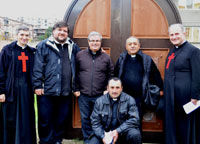 Brave men of all denominationsThis conversation took place in 2010 and we sent the money to buy the land to build the church in 2011. Initially we were given permission to build the church but then a few months later it was withdrawn.
Brave men of all denominationsThis conversation took place in 2010 and we sent the money to buy the land to build the church in 2011. Initially we were given permission to build the church but then a few months later it was withdrawn.
It has been a cat and mouse game ever since about to grant permission then withdrawing it. Last year in the year that was dedicated to mercy by Pope Francis, called ‘The Year of Mercy’ the Catholic Bishop constructed a large church door on the ground that was purchased for the church. This he called the ‘Door of Mercy’ inviting people of all denominations to walk through. To bring focus to the problems of getting permission for the church he invited Pope Francis to walk through this door.
The Pope bravely took up his invitation, came to Rustavi and walked through the door. The Pope as an international figure of course attracted a lot of attention and a good crowd turned up to walk through the ‘Door of Mercy’ including some Muslims who are a small population in Rustavi, and to include the Muslims is such an important gesture. Our Christianity is strongest when we embrace difference, which means opening a door to understanding others beliefs and recognising that almighty God excludes no one.
Below is John Paul II's address to a symposium on
“Holiness in Christianity and in Islam,” Rome, May 9, 1985
“As Christians and Muslims, we encounter one another in faith in the one God, our Creator and guide, our just and merciful judge. In our daily lives we strive to put into practice God’s will according to the teaching of our respective Scriptures. We believe that God transcends our thoughts and our universe and that his loving presence accompanies us throughout each day. In prayer, we place ourselves in the presence of God to offer him our worship and thanksgiving, to ask forgiveness for our faults, and to seek his help and blessing.
“It is a good thing to come to understand each other by learning to accept differences, by overcoming prejudices in mutual respect, and by working together for reconciliation and service to the lowliest. This is a fundamental dialogue which must be practiced in communities, in places of work, in schools. This is the dialogue which is proper to believers who live together in a modern and pluralistic society.
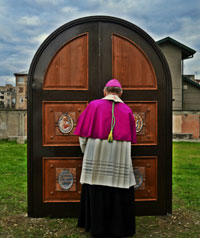 “It has not been granted to us that we form a single community; this is, rather, a test which has been imposed upon us. In confronting this situation, allow me to repeat the advice of the Apostle Paul: ‘Those who have placed their faith in God should set their hearts on the practice of what is good’ (Tt 3:8). This type of mutual emulation can benefit the whole society, especially those who find themselves most in need of justice, consolation, hope - in a word, those in need of reasons for living. We know that by working together fraternally, we will thus be carrying out the will of God.”“All true holiness comes from God, who is called ‘The Holy One’ in the sacred books of the Jews, Christians, and Muslims. Your holy Qur’an calls God ‘Al-Quddus,’ as in the verse: ‘He is God, besides whom there is no other, the Sovereign, the Holy, the (source of) Peace’ (Qur’an 59, 23). The prophet Hosea links God’s holiness with his forgiving love for mankind, a love which surpasses our ability to comprehend: ‘I am God, not man; I am the Holy One in your midst and have no wish to destroy’ (Ho 11:9). In the Sermon on the Mount, Jesus teaches his disciples that holiness consists in assuming, in our human way, the qualities of God’s own holiness which he has revealed to mankind: ‘Be holy, even as your heavenly Father is holy’ (Mt 5:48).The countries that comprise the Caucasus are the Republic of Georgia, Azerbaijan, and the Russian Federation, Armenia, and Abkhazia. (Our allocation for this project is agreed at €750,000 Euro)
“It has not been granted to us that we form a single community; this is, rather, a test which has been imposed upon us. In confronting this situation, allow me to repeat the advice of the Apostle Paul: ‘Those who have placed their faith in God should set their hearts on the practice of what is good’ (Tt 3:8). This type of mutual emulation can benefit the whole society, especially those who find themselves most in need of justice, consolation, hope - in a word, those in need of reasons for living. We know that by working together fraternally, we will thus be carrying out the will of God.”“All true holiness comes from God, who is called ‘The Holy One’ in the sacred books of the Jews, Christians, and Muslims. Your holy Qur’an calls God ‘Al-Quddus,’ as in the verse: ‘He is God, besides whom there is no other, the Sovereign, the Holy, the (source of) Peace’ (Qur’an 59, 23). The prophet Hosea links God’s holiness with his forgiving love for mankind, a love which surpasses our ability to comprehend: ‘I am God, not man; I am the Holy One in your midst and have no wish to destroy’ (Ho 11:9). In the Sermon on the Mount, Jesus teaches his disciples that holiness consists in assuming, in our human way, the qualities of God’s own holiness which he has revealed to mankind: ‘Be holy, even as your heavenly Father is holy’ (Mt 5:48).The countries that comprise the Caucasus are the Republic of Georgia, Azerbaijan, and the Russian Federation, Armenia, and Abkhazia. (Our allocation for this project is agreed at €750,000 Euro)
See Bishop's appeal letter below (Scroll to the right for all the pages)
